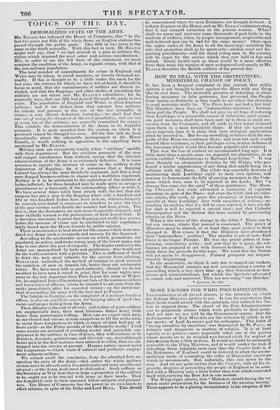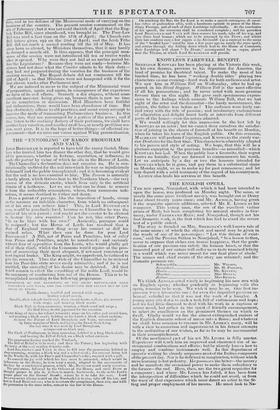MORE EXCUSES FOR WHIG PROCRASTINATION. THE eradication of all proved
abuses, is the principle on which the Reform Ministers profess to act. It was the expectation that their deeds would accord with this principle, that induced the Na- tion to support them. The object of the Tory Administrations was to perpetuate abuses which were profitable to their party. And yet now we are told by the Government organs, that the performances of Tory Ministers are the criterion by which to try the merits of Lord ALTHORP and his colleagues. This habit of "trying ourselves by ourselves," was denounced by St. PAUL, as delusive and dangerous in matters of religion. It is at least equally so in politics—more especially when one of the parties whose merits are to be weighed was turned adrift for neglect of duty arising from selfish motives. It would no doubt be extremely agreeable to the Whig Ministers, and it would render the task of defending them infinitely more easy than the Courier finds it, if the Reformers of England could be induced to adopt the accom- modating mode of estimating the value of Ministerial exertions which be recommends. But, unluckily, this can never be the case. And we are quite certain that the Courier, with all his in- genuity, despairs of persuading the people of England to be satis- fied with a Ministry only a little better than that which contented itself with carrying the Beer Act in one session.
The Whig organ admits, that "Ministers should during the va- cation make preparation for the business of the ensuing session. There appears to be a glaring inconsistency in his adoption of this
rule, and in his defence of the Ministerial mode of carrying on the business of the country. The present session commenced on the 4th of February ; but it was not until thel5th of April that the Eng- lish Tithe Bill, since abandoned, was brought in. The Poor-Law BM was read a first time on the 17th of April; the Church-rate Bill (since given up) on the 21st of April; and the Irish Tithe Bill did not reach a second reading till the 2d of May. It has since been so altered, by Ministers themselves, that it may hardly be deemed a month old. It thus appears, that the principal mea- sures of the session were not introduced till ten or twelve weeks after it opened. Why were they not laid at au earlier period be- fore the Legislature? Because they were not ready—because Mi- nisters had not done what the Courier admits to be their duty— they had not prepared during the vacation for the business of the ensuing session. The Repeal debate did not commence till the 22d of April ; so that Ministers were not hampered with it for the first eleven weeks after Parliament met.
We are induced to recur to the subject of the Ministerial want of preparation, again and again, in consequence of the experience we have of its evil effects. Scarcely a day elapses, without some excellent measure being given up, because there is now no time for its completion or discussion. Had Ministers been faithful and industrious, there would have been abundance of time. But they obstinately adhere to old practices, and scout every attempt to improve the mode of transacting Parliamentary business. In this course, too, they are encouraged by a portion of the press ; and if they listen to the soothing flattery of their partisans, we shall have another lazy vacation, and another profitless, or nearly profitless ses- sion, next year. It is in the hope of better things—of effectual im- provement—that we raise our voices against Whig procrastination.





















 Previous page
Previous page